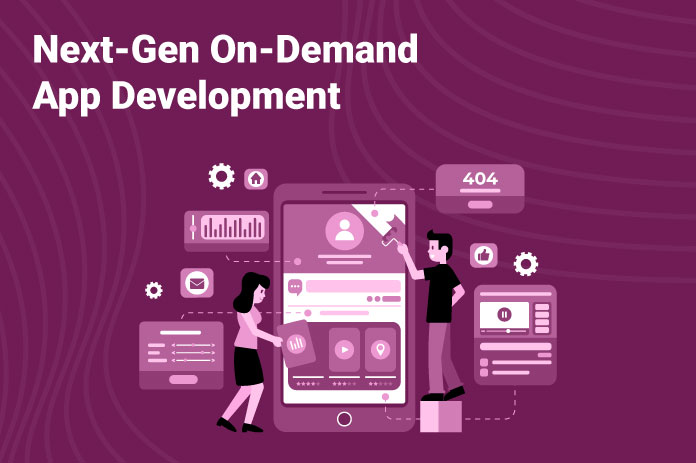Pushing the Boundaries: A Look Into Next-Gen On-Demand App Development

The world of mobile technology is constantly evolving, and with it, the way we access information, entertainment, and services. With the emergence of next-gen on-demand app development, businesses can now push the boundaries of what is possible.
By utilizing the latest cutting-edge technologies, developers are creating apps that are more personalized, interactive, and efficient than ever before.
In this blog post, we’ll look into the exciting world of on-demand app development and how it is revolutionizing how we interact with our devices.
From AI-driven experiences to user-centric design, the possibilities for on-demand app development are endless. So, join us as we explore the exciting new world of next-gen on-demand app development and discover why it is so important for businesses and consumers alike.
Advanced Technologies Used in On-Demand App Development
On-demand app development has seen massive growth in recent times due to the emergence of technologies such as Artificial Intelligence (AI), Augmented Reality (AR) and Virtual Reality (VR).
These advanced technologies enable apps to provide users with a more streamlined, personalized and efficient experience. Let’s look at the details of these technologies and how they are being used in on-demand app development.
Artificial Intelligence (AI)
AI is a branch of computer science that deals with developing intelligent machines that can think and act like humans. It is being used in on-demand app development to provide a more personalized experience for users.
Through AI, apps can understand user behaviour, preferences and interests and make recommendations accordingly. AI also enables apps to have a more natural user interface, which makes them more intuitive and easy to use.
Augmented Reality (AR)
AR is a technology that combines virtual data with real-world environments to create enhanced experiences. It is used in on-demand app development to provide users with an immersive and interactive experience.
For example, a food delivery app can provide users with an AR view of the restaurant where they are ordering from, and a taxi app can provide users with an AR view of their destination.
Virtual Reality (VR)
VR technology allows users to experience an environment in a virtual world. It is used in on-demand app development to give users a more realistic experience.
For example, a real estate app can provide users with virtual tours of homes, and a gaming app can provide users with a virtual world to explore.
VR also enables apps to provide more immersive and interactive experiences for users.
Challenges of On-Demand App Development
It has a lot of challenges apart from advantages. Let’s take a look at it:
Security
Security is one of the key challenges of on-demand app development. As many people use the app, it is essential to ensure that the data is secured and protected from any kind of malicious attack.
The app should use encryption techniques to safeguard data and use authentication for users accessing the app. The app should also be regularly tested for any security vulnerabilities.
Compatibility
Another challenge of on-demand app development is compatibility. The app should be
- Compatible with multiple devices and platforms, including mobile phones, tablets, and desktop computer.
- Able to run on different operating systems, such as iOS, Android, and Windows.
- Be tested on various devices to ensure it functions properly on all of them.
Scalability
The on-demand app should be designed to be scalable to handle an increased load of users and transactions. The backend architecture should be designed in such a way that it can handle large volumes of data and transactions without any performance issues. The app should also be able to handle changes in user demand without any hiccups.
Opportunities for On-Demand App Development
Some main opportunities for on-demand app development include increased efficiency, reach, and lower costs.
Increased Efficiency
On-demand apps can reduce the time and resources needed to provide customer services. For example, businesses can use an app to automate tasks such as scheduling appointments or taking orders. This reduces the amount of time required to perform these tasks, which in turn increases efficiency.
On-demand apps can also facilitate communication between customers and businesses, which helps streamline the customer service process.
Increased Reach
On-demand apps can help businesses reach a wider audience. The app can use anywhere, so customers can access the services from any location. So that means businesses can target customers not within their local area, leading to increased sales.
Businesses can also use an app to promote their services to potential customers, which can help to increase their customer base.
Lower Costs
On-demand apps can help businesses to reduce their costs. As the app can automate tasks and facilitate communication, businesses can save money on labour costs.
Businesses can also reduce their marketing costs by using the app to promote their services to customers. This can also help to reduce the costs associated with traditional advertising.
So overall, on-demand app development provides businesses with a range of opportunities, such as increased efficiency, reach, and lower costs. These opportunities can help businesses to save time and money and increase their customer base.
Conclusion
We now have the technology to make once-impossible ideas come to life. With the right resources and creative minds, we can unlock the potential of the on-demand industry and shape the future of how we work and live.
It is up to us to push the boundaries of what is possible and impact the world. It is an exciting time to be alive, and we should seize the opportunity to make a difference.
